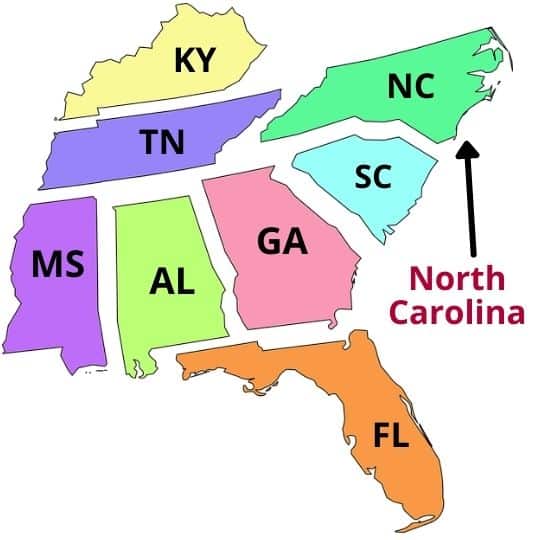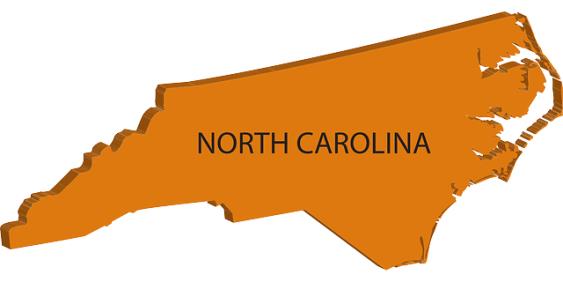Things To Know Before Moving To North Carolina
Is North Carolina a good place to live? That’s today’s topic, so let’s address the question by discussing all the pros and cons of living in North Carolina. Then, you can decide if moving to North Carolina is right for you.
Is North Carolina A Good Place To Live?
The perks of living in North Carolina far outweigh the pitfalls! With the state’s scenic beauty, outdoor recreational options, great job opportunities, modest cost of living, and rich history to explore, life is good for many Tar Heel State residents. On the other hand, high taxes, limited public transportation, lackluster schools, and the threat of hurricanes turn some people off about living in North Carolina.
Next, let’s dig deeper by considering North Carolina’s pros and cons.
Pros And Cons Of Living In North Carolina: Side By Side Comparison
| Living in N. Carolina Pros | Living in N. Carolina Cons |
| 1. Patriotic and historic | 12. Excessive income taxes |
| 2. Diversity of people | 13. High property taxes |
| 3. Big cities or small towns | 14. Costly sales taxes |
| 4. Modest cost of living | 15. Sub-par K-12 schools |
| 5. Job opportunities | 16. Higher crime rate |
| 6. Tax breaks for retirees | 17. Lacking seasonal weather |
| 7. Top-notch higher education | 18. Hot and humid summers |
| 8. Nice year-round weather | 19. Threat of hurricanes |
| 9. Outdoor recreation | 20. Limited public transit |
| 10. Excellent barbecue | 21. Heavy traffic congestion |
| 11. High-quality healthcare |
Next, we dive deeper into these traits that make North Carolina unique by discussing these pros and cons.
By the time we’re through, you’ll be equipped with the insights to answer the burning question: Is North Carolina truly the ideal place to call home?
Let’s get moving and discover the heartbeat of this amazing state!

Disclosure: At no cost to you, I may get commissions for purchases made through links in this post.
Pros Of Living In North Carolina
1. North Carolina Is A Patriotic And Historic State
North Carolina has a rich history and a patriotic feel about it.
For example, the state is one of the original 13 colonies that sought independence from British rule. Interesting historical sites can be found all over, for example:
- The Biltmore Estate
- The Cape Hatteras Lighthouse
- Civil War battlefields
- Roanoke Island Festival Park
- Wright Brothers National Memorial
Source: NC.gov
2. A Diverse Mix Of People Live In North Carolina
After moving to North Carolina, you will experience friendly residents, southern charm, and diversity.
First, thousands of young adults attend the state’s top-notch universities. Many choose to stay after graduation.
Furthermore, the long-time North Carolina locals are down to earth. Many have resided in the area for generations.
Finally, North Carolina is a magnet for retirees. They come to escape the cold winters and urbanization in other parts of the country.
3. North Carolina Has Small-Towns And Big-City Living To Choose From
North Carolina is home to hundreds of small towns in the mountains, on the Atlantic coast, and everywhere between its Western and Eastern borders.
Fortunately, the charm and sense of community aren’t reserved for the state’s small towns.
For example, North Carolina’s larger cities like Raleigh-Durham have much to offer residents. The Raleigh metropolitan area is home to state-of-the-art businesses and universities. Many are located in the research triangle.
North Carolina also has a bustling regional financial center second only to “The Big Apple” in New York. I’m referencing Charlotte, the state’s largest city, home to many transplanted residents, and another great place to live.
As a result, some of the most diverse communities can be found in North Carolina’s larger cities.
4. Residents Enjoy A Moderate Cost Of Living In North Carolina

North Carolina isn’t the cheapest state to live in. However, you can balance your budget here compared to some of the highest-cost states.
For example, the state’s cost of living index is 4% less than the national average. Groceries, housing, utilities, and transportation contribute to the cost savings. (Source: MERIC cost of living data series)
However, choose your location wisely. The larger cities and popular coastal areas are more costly than small towns in the middle district of North Carolina.
Finally, to save more money, sign up for the rebate service from Rakuten. The app is an excellent way to earn cashback on all your online purchases.
However, cutting costs isn’t the only way to make ends meet after relocating to North Carolina as the pros and cons roll on.
5. Jobs And Economic Opportunity After Moving To North Carolina
North Carolina has a robust job market. The unemployment rate typically runs at or below the national average.
For example, Charlotte is a major U.S. financial center. Raleigh, Durham, and Chapel Hill anchor the state’s research triangle. The many quaint coastal and mountain towns have vibrant hospitality industries.
For business owners, the corporate tax rate here is a competitive advantage. The state has one of the lowest corporate tax rates in the country, attracting businesses that create jobs of all kinds.
6. Social Security Taxes Aren’t Taxed In North Carolina
Fortunately, the state does not include social security benefits as part of taxable income for North Carolina retirees.
Thus, retirement living in North Carolina and collecting federal social security benefits after you move means this state cuts you a tax break.
Related reading: Retirement taxes in North Carolina
7. Living In North Carolina Means Having Access To World Class Higher Education
North Carolina is home to these elite schools:
- North Carolina State University
- University of North Carolina
- Duke University
They are world-renowned centers for research, higher education, and learning. All are located in one of the best southern states in the country, North Carolina.
As a result, you can continue your education or keep the kids close to home for college in North Carolina.
Okay. Enough about money and all the jobs and economic opportunities “The Tar Heel State” offers. Next, onto everyone’s favorite topic, the weather.
8. Residents Love North Carolina’s Temperate Weather And Mild Winters

North Carolina’s summers are warm. Autumn is crisp and beautiful. Unless you choose to live in the mountains, winters are mild, and snowfall is limited.
As a result, residents enjoy North Carolina’s great outdoors year-round in comfortable weather.
Here’s an interesting point. Have you heard of people referred to as “halfbacks”?
Halfbacks are Northerners who first chose to migrate or retire to Florida. However, they found the state’s hot, humid, tropical climate too much to handle. So, many Floridians moved halfway back to North Carolina for the enjoyable weather!
Next, I have one of my favorite perks of living in North Carolina.
9. North Carolina Has An Abundance Of Outdoor Recreational Opportunities
North Carolina shines bright with its broad range of outdoor recreational opportunities. Let’s dive deeper into some of your options.
Hiking. There are 100s of miles of hiking trails serving both beginners and advanced hikers.
You can pick between the Blue Ridge Mountains and the Appalachian Mountains for rugged terrain. The Appalachians are shared with Tennessee, the state next door to the west.
Biking. The same terrain loved by hikers makes for some awesome mountain biking. Or challenge your road biking fitness on some steep paved mountain roads.
Boating and fishing. This state has many lakes and rivers that are wide, long, and deep. Thus, you will find great spots for fishing, water sports, and boating.
Beaches. There are miles and miles of sandy beaches along the state’s seacoast. Consider the historic port city of Wilmington or a beach farther north near Surf City.
Furthermore, don’t forget about the spectacular sandy beaches of the Outer Banks. This group of barrier islands on North Carolina’s coast separates the Atlantic Ocean from the mainland.
The Outer Banks are similar to Assateague Island, a 37-mile barrier island and national park off the coastal state of Maryland.
Golf. North Carolina has lots of golf courses. There is a course to match every player’s skill. Plus, the temperate climate means you can hit the links almost year-round.
Take in the views. And for the less adventurous, get out and enjoy the scenic views.
You will discover colorful sunsets to the west. The sun rising over an Atlantic beach and the mist on the peaks of the Smoky Mountains not far from the North Carolina city of Asheville.
Next, if all the outdoor fun makes you hungry, let’s talk about food.

10. North Carolina Is Known For Its Barbecue
North Carolina is famous for its pork-based barbecue that is smoked low and slow. Furthermore, residents can enjoy two distinct regional styles of smoked pork and sauce.
First, there is the Eastern style. It has a vinegar and pepper-based sauce. The focus is on the smoked meat, with the sauce acting as a complement.
Second, many residents prefer Western-style North Carolina barbecue. It has a classic ketch-up-based sauce using plenty of flavorful seasonings. The sauce and meat come together, making for a fantastic combination.
Next, onto more serious matters.
11. North Carolina Residents Have Access To Quality Health Care
North Carolina’s health care services may cost a little more than you are used to. However, you get what you pay for since the quality of care is outstanding.
The state is home to several excellent medical schools at:
- Duke University
- East Carolina University
- The University of North Carolina at Chapel Hill
- Wake Forest University
And two highly respected healthcare centers:
- Duke University Medical Center
- UNC Hospitals.
North Carolina’s top-notch healthcare systems house dozens of specialty divisions, clinics, and departments. They seek to diagnose and treat illness or injury anywhere within your body or mind.
Finally, the advanced medical facilities in the state include dozens of highly trained medical specialists ready to work with you.
Okay. It’s time to switch gears.
The pros and cons of living in North Carolina would not be complete without honestly assessing some reasons not to move to North Carolina in the first place.
Let’s discuss these important points next.

Cons Of Living In North Carolina
12. North Carolina’s Individual Income Tax Rate Is Higher Than I Prefer
North Carolina has a flat income tax system. That means no matter how much money you make, you and everyone else are subject to the same 4.5% income tax rate.
Compared to the nearby states of Tennessee and Florida, which do not have a state income tax, this is a large financial burden placed on North Carolina residents.
However, there is some good news. Specifically, the state government has steadily reduced the income tax rate over the past decade. As recently as 2016, the state’s income tax rate was 5.25%.
Related reading: Living in Tennessee vs. N. Carolina compared
13. North Carolina Property Taxes Are No Bargain
North Carolina residents pay an average of .8% of the assessed value of their property annually in real estate taxes.
You can find much lower property taxes by hopping over the state’s southern border and choosing to live in South Carolina.
Related reading: Is North or South Carolina living better?
14. Resident Must Pay Up For Sales Taxes In North Carolina
North Carolina has high sales taxes.
By combining the state’s base sales tax rate with the additional amount local municipalities can add, rates push 7% on your daily purchases to sustain your North Carolina lifestyle.
Unfortunately, the taxes charged to North Carolina residents haven’t produced a top-notch school system. Let’s discuss this vital topic for families moving to North Carolina next.
15. North Carolina Has A Sub-Par K-12 Education System

North Carolina’s K-12 education system is sub-par compared to other states. Some issues, in particular, keep education quality ratings down.
For example, you can specifically point to poorer performance as it relates to:
- High school graduation rates
- ACT and SAT standardized test scores
- Reading scores
- Student-to-teacher ratios
- Percentage of residents without high school diplomas
So, the K-12 school system falls a little short.
However, there are pockets of quality in specific North Carolina school districts. Thus, if you are a parent of school-aged kids, be selective about where you live in North Carolina. Or find a place in your budget for private school tuition.
Related reading: Pros and Cons of Living in Georgia
16. North Carolina Residents Experience High Crime Rates
North Carolina ranks in the bottom half of all states for both violent crimes and property crimes.
That said, plenty of safe places to live in the state exist. However, it’s just like picking a good school district. Do your research before settling down to ensure your family’s safety.
Next, back to everyone’s favorite topic! The weather.
17. Four Weather Season Living In North Carolina Isn’t Guaranteed
Suppose you are moving to North Carolina from a place with distinct seasonal weather patterns. Then, you may not like your new life in North Carolina.
For example, much of the state does not experience the chill of late fall and early winter. Furthermore, there is little snowfall if you dream of a white Christmas. Thus, the dramatic reawakening from a spring thaw is not part of the weather dynamic here.
However, if you must have 4-season weather conditions and like to shovel a little snow around the winter holidays, consider moving to the higher elevations in North Carolina’s Western region.
18. North Carolina Living Means Hot Summers
North Carolina summers are hot and humid. Sometimes, temperatures will rise to 90 degrees or higher for many days.
For cooler summer temperatures, relocate near the mountains in the western part of the state.
19. North Carolina Coastal Residents Must Deal With The Threat Of Hurricanes
North Carolina’s hurricane season is no joke and no secret. The season lasts from June through November, with the last three months representing peak season.
The state is ranked fourth, after Florida, Texas, and Louisiana, in the number of cyclones that produced hurricane-force winds. Yet, people keep moving to the coastal regions for everything it offers.
For everyone else, locate at least 100 miles inland to reduce your risk of experiencing a hurricane in North Carolina.
20. Public Transportation Is Limited In North Carolina For Those Who Don’t Own A Car
Even in North Carolina’s major cities, public transportation is inefficient and lacks sufficient coverage. In small towns and rural areas, it’s nonexistent.
The statistics reveal that the state is ranked number 31 for public transit usage. (source: U.S. News and World Report)
Unless you can pull off living, working, and recreating in a confined area, plan on owning a car to get around.
21. Moving To North Carolina’s Major Cities Means Sitting In Traffic Congestion
Charlotte, Winston-Salem, Greensboro, and Raleigh all rank in the top 75 worst U.S. cities for traffic congestion. (source: tomtom traffic index)
On the other hand, traffic moves outside the major metro areas and sometimes moves too fast, making for dangerous road conditions.
Thus, after moving to North Carolina, be prepared for fast, aggressive drivers and heavy traffic in certain parts of the state.
Okay. That concludes my review of the pros and cons of North Carolina.
Please allow me to wrap it up by providing additional resources.
Pros And Cons Of Living In North Carolina: Best Places To Live & Other Resources

Is North Carolina a good place to live? Armed with the information from this post, you can decide.
Most noteworthy, your next question might be: where to live in North Carolina? Please allow me to suggest a few places and related resources.
Asheville
Asheville’s location in the Blue Ridge Mountains means numerous outdoor activities. Plus, arts, culture, music, and an incredible restaurant scene. Read more about Asheville living.
Charlotte
Charlotte is considered one of the best places to live in the United States by reputable sources, including US News & World Report, Niche.com, and Livability.com. Read more about living in Charlotte.
Jacksonville
Jacksonville, North Carolina, might be the perfect spot for anyone desiring to live in a small town near the Atlantic Ocean. Read more about living in Jacksonville.
Raleigh
Raleigh is the capital of North Carolina. Life in this family-friendly city near North Carolina’s Research Triangle is hard to beat. Read more about life after moving to Raliegh.
Winston-Salem
Winston-Salem offers a blend of moderate-sized city living with a small-town feel. Residents enjoy the close-knit community and the big-city-like amenities. Read more about Winston-Salem’s pros and cons
More Reading About The Pros And Cons Of Life In North Carolina And Far Beyond
Finally, try these articles from my archives to expand your relocation search beyond North Carolina.
- Find your best place to relocate
- Most affordable places in Tennessee
- A small but likable state not far from North Carolina
- What every state is known for
Good luck, no matter where you choose to settle down!
Author Bio: Tom Scott founded the consulting and coaching firm Dividends Diversify, LLC. He leverages his expertise and decades of experience in goal setting, relocation assistance, and investing for long-term wealth to help clients reach their full potential.
